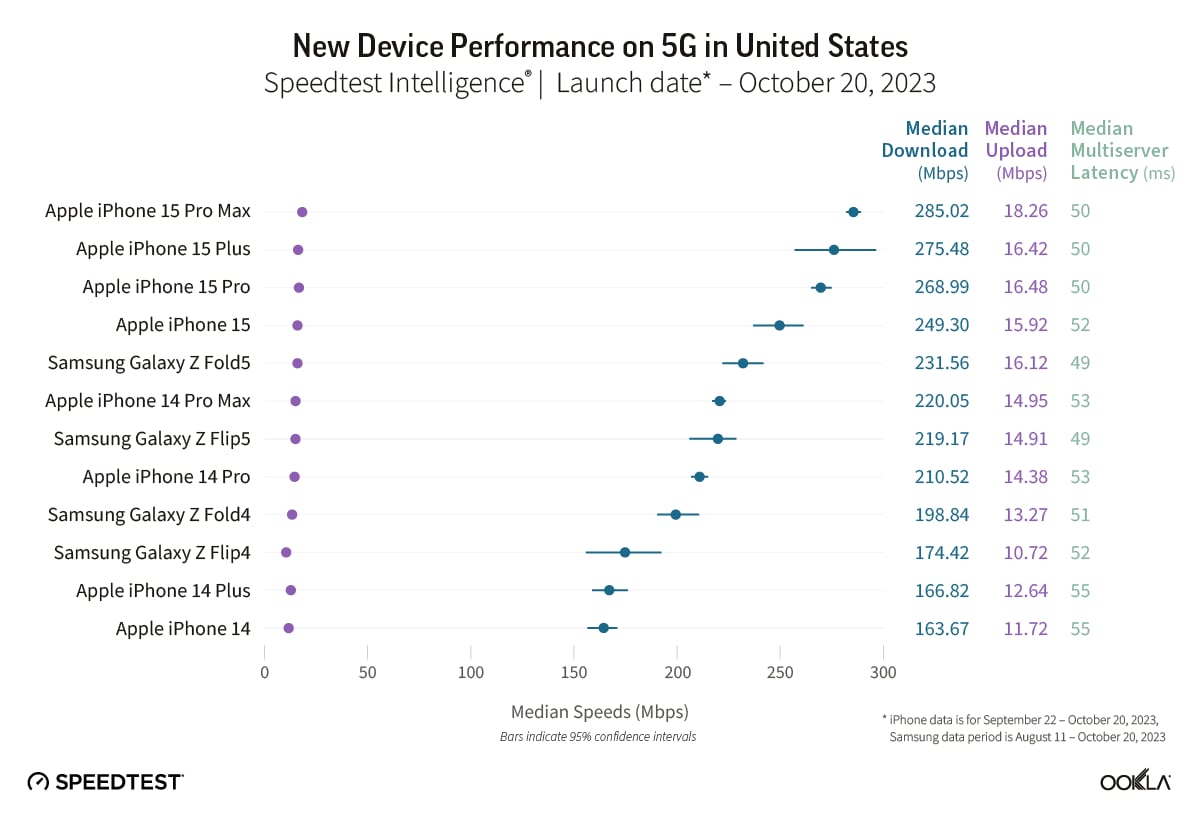The iPhone 15 models are equipped with Qualcomm's X70 modem chip that promises faster 5G speeds than the X65 in the prior-generation iPhone 14 models, and testing shared by Ookla confirms that download speeds have notably improved.

Using data collected from its online Speedtest for measuring connection speeds, Ookla has been able to determine that the iPhone 15 models support download speeds that are up to 54 percent faster than the download speeds available on the iPhone 14 models.
Compared to their equivalent iPhone 14 models, the iPhone 15 Plus saw 54 percent faster download speeds, the iPhone 15 had 45 percent better download speeds, the iPhone 15 Pro Max was 27 percent faster, and the iPhone 15 Pro had a 25 percent better download speed.
The iPhone 15 models had the fastest download speeds out of all the Apple and Samsung devices included on Ookla's results list. Median download speeds on the iPhone 15 Pro Max were at 285Mb/s, and the other iPhones weren't far behind.
The iPhone 15 had the slowest median download speed out of Apple's lineup at 249Mb/s, but it still came out ahead of Samsung's latest smartphones, including the Galaxy Z Fold5 and the Galaxy Z Flip5.
Note that Ookla's data covers median download speeds across the entire United States, and connectivity could vary depending on location, proximity to a major city, location of the closest cellular tower, carrier, and more. Data shared for the iPhone was collected from September 22 to October 30.
5G download speeds also improved in multiple other countries, including Australia, Brazil, Canada, France, India, South Korea, Spain, the UK, and the UAE, with full results available on the Ookla website.
This article, "iPhone 15 Models Have Up to 54% Better 5G Download Speeds Than iPhone 14 Models" first appeared on MacRumors.com
Discuss this article in our forums
Source: TechRadar

Using data collected from its online Speedtest for measuring connection speeds, Ookla has been able to determine that the iPhone 15 models support download speeds that are up to 54 percent faster than the download speeds available on the iPhone 14 models.
Compared to their equivalent iPhone 14 models, the iPhone 15 Plus saw 54 percent faster download speeds, the iPhone 15 had 45 percent better download speeds, the iPhone 15 Pro Max was 27 percent faster, and the iPhone 15 Pro had a 25 percent better download speed.
The iPhone 15 models had the fastest download speeds out of all the Apple and Samsung devices included on Ookla's results list. Median download speeds on the iPhone 15 Pro Max were at 285Mb/s, and the other iPhones weren't far behind.
The iPhone 15 had the slowest median download speed out of Apple's lineup at 249Mb/s, but it still came out ahead of Samsung's latest smartphones, including the Galaxy Z Fold5 and the Galaxy Z Flip5.
Note that Ookla's data covers median download speeds across the entire United States, and connectivity could vary depending on location, proximity to a major city, location of the closest cellular tower, carrier, and more. Data shared for the iPhone was collected from September 22 to October 30.
5G download speeds also improved in multiple other countries, including Australia, Brazil, Canada, France, India, South Korea, Spain, the UK, and the UAE, with full results available on the Ookla website.
Related Roundups: iPhone 15, iPhone 15 Pro
Tag: 5G
Buyer's Guide: iPhone 15 (Buy Now), iPhone 15 Pro (Buy Now)
Related Forum: iPhone
This article, "iPhone 15 Models Have Up to 54% Better 5G Download Speeds Than iPhone 14 Models" first appeared on MacRumors.com
Discuss this article in our forums
Source: TechRadar